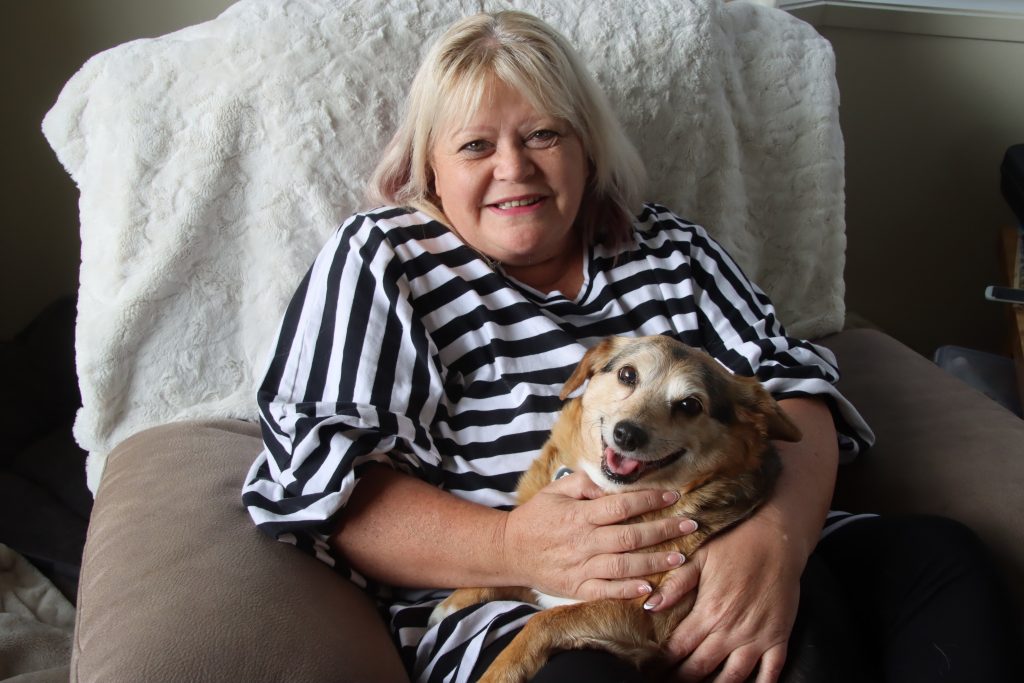The Breast Cancer Society’s Pink Ribbon Street Appeal is being held at the end of the week. The Ensign reporter Sandy Eggleston chatted with Gore woman Kim Scott about her journey with the disease.

People she calls her ‘‘cancer angels’’ have played a big role in her recovery from breast cancer, Kim Scott says.
The former Wyndham School principal was diagnosed with breast cancer in 2017 and had her first mastectomy shortly afterwards, and a second in 2018.
The process of recovering was ‘‘harrowing’’, she said.
After the mastectomy, there were wounds that needed to be dressed daily and it was very hard to use her arms and shoulders.
‘‘After you’ve had a breast off, they’ve cut all the muscles in your chest and you can’t lift your arms.’’
It was during her recovery many angels helped her.
One angel was her hairdresser, who for six weeks came and washed and dried her hair.
Another was a neighbour who hung out the washing for her.
A massage therapist helped her regain the use of her muscles.
The district health nurses were very supportive and understanding.
The support of colleagues, family and friends was also important.
‘‘I was surrounded by my husband, son and family, who just loved me for who I was, and so that’s what got me through.
‘‘There’s a whole lot of people out there that support you in this stuff.
‘‘The love and the care of these people are what make the difference for you to get through.’’
Her dog, Bella, was a faithful friend and stayed close by.
The impact of breast cancer was not just physical, she said.
‘‘It impacts you emotionally because you don’t have boobs anymore and it impacts your confidence.’’
Attending a monthly support group for breast cancer survivors had also helped.
‘‘You are sitting around the table with a group of women who have been through it, so every question you have can be answered by other people who have that experience.
‘‘That in itself was magic.’’
While it was not easy sharing her story, she believed breast cancer was something people should be able to talk about, Mrs Scott said.
‘‘A lot of women hide they’ve got breast cancer because it’s breast, and so it’s like you shouldn’t talk about it.’’
Breast cancer was no longer a death sentence as there were new drugs available, she said.
She felt very fortunate to have survived.
‘‘It’s made me really stop and notice the small stuff and to make sure I make use of every moment.
‘‘It made me grateful.
‘‘It made me so thankful of what I’ve got and of the people around me,’’ she said.
Ever since her cousin was diagnosed with the disease in her early 30s, she had regularly examined herself.
‘‘I was religious about self-examination.
‘‘That heightened me to make sure I was looking.’’
When she discovered tenderness in her armpit, she went to the doctor and subsequent testing showed there were two sites of cancer.
One was a lump and another was a spiderweb-shaped mass.
There was no cancer in her lymph nodes, so she did not need chemotherapy and, because she had a mastectomy, did not need radiation.
A year later, she noticed a discharge from the other breast and had another mastectomy, but there was no cancer.
‘‘I chose to have a second mastectomy, to be on the safe side.’’
She was very impressed with the treatment she received in Southland Hospital’s women’s health department, Mrs Scott said.
‘‘They are seriously good. They are phenomenal.’’




